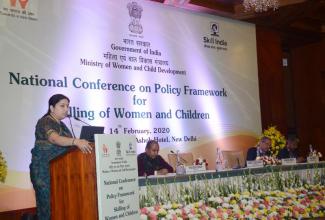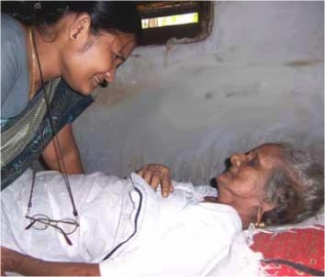
A detailed study has been undertaken by Indian Social Responsibility Network (ISRN) to document and compile Antyodaya based best practices as propounded by Pandit Deendayal Upadhyaya. This is an attempt to bring forth the efforts of all those who are working to uplift the last man in the society. This compilation was done in 2018-19. In this section of the website we are posting work and achievements of some unsung heroes, as documented by ISRN. – Editor
Here is the fifth post of the documented best practices. This post is on a unique initiative taken by Shyam Sunder Paliwal by generating awareness on girl child survival among his village- Piplantri in Rajasthan. - Editor
You can also read the earlier posts. (Links given below)
According to Article 6 of UNCRC (United Nations Convention on the Rights of the Child) every child has the right to survival without any discrimination. But unfortunately the girl child in Indian context has always been connoted and served with the unequal proportions pertaining, even to her most fundamental rights to take birth. To address the issue, a unique initiative was taken by Shyam Sunder Paliwal by generating awareness on girl child survival among his village- Piplantri in Rajasthan. In 2007, he initiated a campaign to plant trees on birth of every girl child.
Rationale and Objectives
The rise in sex selection is alarming, reflecting the persistent status of women and girls. The resulting gender imbalance also has a damaging effect on societies. Instances of increased sexual violence and trafficking have already been linked to the phenomenon. Population in the age group of 0-6 years declined from 78.83 million in 2001 to 75.84 million in 2011. During the period 1991-2011, the child sex ratio (0-6 years) declined from 945 to 919
Rajasthan, that has a history of female foeticide, has one of the worst Child Sex Ratio in the country
—less than 900 in 18 districts. In 2011, the severity of the problem seemed to be spreading across rural areas more rapidly than before. Gender biased sex selection is a discriminatory practice that is a result of a complex web of factors: deep-rooted patriarchal mindsets that lead families to value sons over daughters, the need for small families but with sons, and commercialisation and misuse of medical technology that enables illegal sex selection. However, in response to these varied dynamics existing in the country, a passionate environmentalist, Shyam Sundar Paliwal, the former Village Pradhan started the initiative to celebrate the birth of girl child by planting trees to bring about a change in attitudes towards the girls in the memory of his daughter Kiran, who died a few years ago.
Implementation Process
Piplantri village in Rajasthan had initiated this campaign to encourage empowerment of women and environment conservation, along with increasing employment opportunities. For the people of Piplantri in the Rajsamand district of Rajasthan, the birth of a girl child was associated with bad news. This was mainly due to the hefty dowry system prevalent in the village. Social campaigner and ex-sarpanch of Piplantri village Shyam Sunder Paliwal envisioned a bright future for the girls by celebrating the birth of girl child. The celebration aims to promote mainstreaming the girls in the family as well as promote gender equality. Knowing the society being fabricated with the strong patriarchal notion, these events aims to break the myth (celebration happen only with the birth of the son) & challenge the social process towards equality.
To celebrate the birth of a girl child, 111 trees are planted by her parents, grandparents and relatives. The village panchayat, women self-help groups, elderly ladies, grandmothers, aunts take care and maintain those platform time to time.
Empowering girls - Daughters become self-reliant
Planting trees is just one part of Paliwal ji’s plan to empower girls and women in his village. To ensure financial security, Paliwal Ji adopted a scheme “Kiran Nidhi” started by social worker Anna Hazare. As per the scheme, after the birth of a girl child, the villagers contribute INR 21,000 collectively and INR 10,000 from the parents and put it in a fixed deposit bank account, which can be used only after she turns 20. To make sure that girl child receives proper education, the villagers make the parents sign an affidavit (legal contract) which restricts them from marrying her off before she attains the legal age for marriage, including the following conditions as well:
- No one from my family will be involved in foeticide.
111 trees planted on the birth, and the girl child will be raised with equal care.
- I will not keep my daughter from getting educated.
- I will spend this money on my daughter’s wedding and/or higher education.
- The trees planted at birth will be the property of the village.
Along with this, all official formalities are completed for the Janani Suraksha Scheme and other beneficial government bond schemes.
Paliwal ji also made use of the Panchayat doorstep programmes to tour the villages and speak to women on empowerment. He got the women self-help groups and Bhamashahs to consider this scheme as unique from the perspective of the safety of girls. As the idea took off, the villagers realised that there was no need to worry about dowry because the trees they plant when a girl child is born will take care of her expenses in the future. (The Bhamashah scheme was started with the objective of bringing financial inclusion and empowerment of women. It is a family-based programme in which a bank account and a Bhamashah card are made in the name of the lady of the house. This empowers her to become the decision-maker in the family).
Paliwal ji made many inclusions to the scheme to reflect the changing needs of the times and to ensure the comprehensive development of the girl child, not just at school, but at home as well.
Impact
The idea of celebrating the birth of a girl child by planting trees is what makes this scheme truly revolutionary. About 3 million trees have been planted since 2007. They made the village environment friendly and attracts the tourists with its herbal medicine park, watershed model, etc. The initiative had also allowed an easier access to water (now available only 3 meters underground, compared with the previous 200 meters). The planting program also gave income-generation opportunities to many people; it improved families’ conditions, and allowed the extraction of medicines. The crime rate had also dropped and reportedly there have been no police cases in the village in last 7-8 years.
The initiative has also helped the town’s economy
To keep termites away from the trees, many of which bear fruit, the village had planted more than 2.5 million Aloe Vera plants around them. Gradually, the villagers realized that Aloe Vera could be processed and marketed in a variety of ways. So the community now produces and markets aloe-based products like juice and gel, among other things.
Challenges
The major challenge that Paliwal Ji faced was persuading the people to plant trees in the area encroached by them. They often uprooted the trees in disagreement to the initiative. The cooperation that Paliwal ji earned was not easy. He overcame this problem by attaching the tree planted in the name of a family member who dies. Since then people of Piplantri also plant 11 trees whenever a family member dies. This way he ensured honouring of the land where the ancestors lived and died. People not only planted the trees, but also took care of them like their own family member.
Replicablity and sustainability
The practice has sustained itself since 2007 and established itself as a ‘model practice’ to be adopted for women empowerment and environment conservation simultaneously. It has already been replicated at international level. In 2014, the students of Denmark University visited the panchayat to study the initiative. The initiative had also been included in the syllabus of Denmark. Piplantri Model is officially adopted by Government of Rajasthan and Maharashtra. Many villages are working on this model. This model is covered in Rajasthan education syllabus as well. The village was awarded by PM Modi on ‘Jal SwalambhanYojna” that was adopted by whole Rajasthan state. Government of Namibia also adopted the same model. Piplantri model is adopted in many villages in Jharkhand, Chhattisgarh, Jammu and Kashmir, Uttar Pradesh, etc.
EARLIER POSTS
4. EKAL - Massive Literacy Mission Without Massive Resources http://bharatmahan.in/unsung-heroes/ekal-massive-literacy-mission-without-massive-resources
3. Giving her power, funding her education: Bharatiya Stree Shakti http://bharatmahan.in/unsung-heroes/giving-her-power-funding-her-education-bharatiya-stree
2. Virtual Classes & Technology For Providing Best Education http://bharatmahan.in/unsung-heroes/virtual-classes-technology-providing-best-education
1. A Science Bridge To Nourish Young Minds – ‘Swa’ - Roop Wardhinee http://bharatmahan.in/unsung-heroes/science-bridge-nourish-young-minds-swa-roop-wardhinee
@isrnnewdelhi
isrn.in
K-13, First Floor, South Extension II, New Delhi-110049










